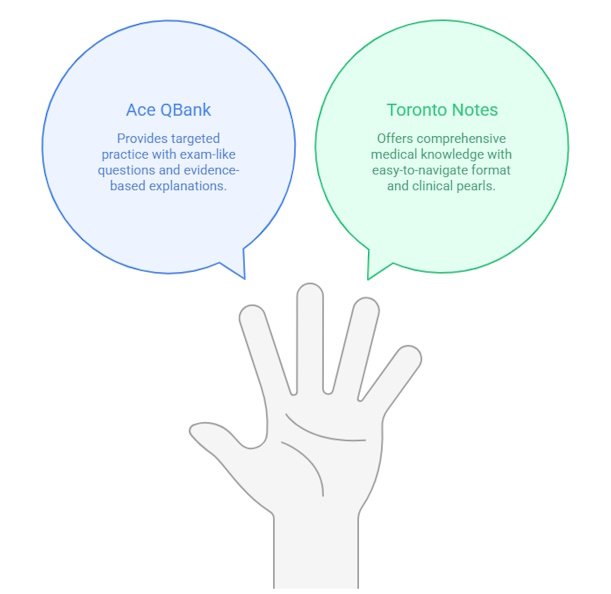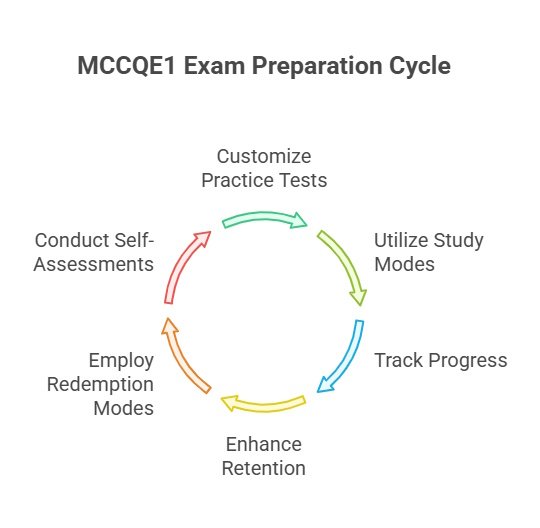Top Resources for MCCQE1 Exam Prep for IMGs

Canada’s future doctors face a tough gatekeeper. And the MCCQE1 doesn’t mess around. It demands strategy and solid medical knowledge. You need to read every question like a chart in Emerg. Miss the clinical clue and the right answer slips past like black ice on the 401.
The latest look at MCCQE1 results tells a hard truth. International medical graduates aren’t passing at the same rate as Canadian medical grads. That gap isn’t just statistics. It is a signal that preparation matters. And for many IMGs, the pathway still feels steeper than it should.
As Nelson Mandela reminded us, “Education is the most powerful weapon which you can use to change the world.” For many IMGs that weapon needs better armour. Therefore, in this post, I will highlight the top Canadian resources for MCCQE1 Exam Prep for IMGs.
The Essential Facts You Need to Know About MCCQE1 for Success
The exam is an important step for International Medical Graduates (IMGs) aiming to practice medicine in Canada.
This comprehensive, computer-based exam assesses a candidate’s medical knowledge. Along with critical thinking and decision-making skills in clinical scenarios relevant to medical practice in Canada.
Therefore, understanding the structure and segments of the MCCQE1 is crucial for success. Before you even sit down at the keyboard, here’s the lay of the land. This exam runs on a computer. Two parts. A total of 230 multiple-choice questions. Each part packs 115 questions.
You will get 2 hours and 40 minutes per part, plus a scheduled 45-minute break in between. You can flag questions and circle back within each part. No penalty for wrong answers. None. So don’t leave anything blank.
Based on the above exam format. Three takeaways jump off the screen:
- The exam time is fixed
- Strategy makes or breaks you.
- You control the pace.
Meaning that no one gets a bonus second. And you have 160 minutes for the whole part. If you do the math, that works out to about 1 minute and 23 seconds per question.
So, in order to be able to answer all the questions. You have got to set a “move on” rule at 90 seconds for tougher questions, then come back if time remains.
What Is the Must-Know 2025 MCCQE1 Update for Success?
One of the most significant changes is the discontinuation of Clinical Decision-Making (CDM) cases.
CDM cases were previously an integral part of the exam. Where candidates were required to demonstrate their ability to make sound clinical judgments based on presented scenarios.
You didn’t hear it from me. But this was the stretch where most candidates clawed back lost ground on those missed multiple-choice questions. It earned a quiet reputation as the exam’s score booster. Because it was more forgiving and far less punishing than the first section.
From April 2025, the exam format shifted towards a single MCQ-based scoring system. This means that all candidates will be evaluated solely on their performance in the MCQ section of the exam, without any additional assessment through CDM cases.
What Opportunities Does the Change Create for IMGs Preparing for the Exam?

The ground has shifted quietly, but decisively. A clinically driven MCQ now sets the stage for IMGs who have waited for a fair shot. This change brings clarity and cuts the noise while placing judgment at the centre.
With CDM out, they can pour every ounce of effort into one test format. For IMGs, that means one battleground. One playbook.
This is a strategic moment for them. They can sharpen skills that move the needle. However, they should study smarter, measure what works and drop what doesn’t. All to the point where their prep becomes a disciplined routine and progress stops feeling random.
In the exam, your knowledge speaks first and your decisions carry the weight. It is where focus meets opportunity and a study plan pays off.
Although the new exam format rewards precision. And candidates who know the safe and guideline-aligned next step under pressure.
That doesn’t mean strategies like reading a question stem carefully, scanning for red flags or going to the last line first. Can’t help you separate the signal from the noise or watch for distractors that tempt you into overreach. It is actually the opposite.
By the way, that’s a huge win for IMGs with strong test-taking skills. And here is another advantage many IMGs will feel. With no written component in this new format. IMGs will not lose ground to phrasing. And now they will be graded on clinical judgment solely.
That said, IMGs still need a disciplined approach to bend this format to their strengths. I will discuss more on how you can do it without hassle later on.
Let’s see what several Key opportunities you can seize here:
- Singular focus and efficiency
- Transfer advantage from prior MCQ prep
- Reintegration of “CDM thinking” into MCQs
The bottom line is that the change simplifies the mission and sharpens your edge. Now there’s one format, one rhythm, and one standard to master. You can pour your energy into the skills that matter on test day.
This clarity reduces friction and trims the MCCQE1 exam preparation. It turns your MCCQE1 prep into a clean, repeatable system. More importantly, it removes the guesswork about what to study next.
Don’t forget the value of test-taking skills in the new format. For IMGs with experience in MCQ-style board exams, the good news is they can flex those muscles.
Your pacing, your way of scanning a question, and your recovery strategy all transfer. You’re not starting from zero. You enter this format with a toolkit in hand. That creates early wins and sets a tone you can carry forward.
CDM cases have been dropped from the exam, but don’t shelve CDM thinking. You still need to weave clinical decision-making into MCQs. This mindset keeps you out of low‑yield traps and steers you to the correct answer.
What Are the Top Resources for the MCCQE1 Exam Prep?

When it comes to preparing for the exam. Your resource choice makes all the difference between feeling overwhelmed and feeling empowered.
However, everyone has an opinion. Every company claims to have the magic bullet. And you are left wondering where to invest your most precious assets, time and money.
The truth is, you only need Canadian resources. After years of seeing what works, a powerful, two-part combination consistently rises to the top. A high-quality question bank and a comprehensive, high-yield textbook.
Your cornerstone for active learning should be Ace QBank. A question bank is where theory meets practice, and it is engineered specifically for this purpose. It comprehensively covers the Medical Council of Canada (MCC) objectives.
Ensuring that every minute you spend practicing is targeted toward the exam’s required competencies. The questions aren’t just relevant; they are designed to meticulously mimic the format and complexity of the actual exam.
Conditioning you for the intellectual rigour of test day. However, the Qbank truly distinguishes itself in its features built for targeted learning.
Its evidence-based medicine explanations are more than just answer keys. They are concise, up-to-date mini-lessons that explain the “why” behind the “what.” A crucial component for long-term retention.
The other platform’s standout feature is its customizability. You can generate practice tests from 21 distinct categories. Allowing you to zero in on your specific weak spots.
Whether you choose the “timed” mode to simulate exam pressure. Or the “tutor” mode for a deliberate, step-by-step review. You are in complete control of your learning.
Your second essential resource is Toronto Notes. Think of it as the foundational library that complements Ace QBank’s active workshop.

While the QBank tests your application of knowledge. Toronto Notes builds the comprehensive knowledge base you need to draw from. For decades, it has served as the definitive reference for Canadian medical graduates, and for good reason.
Its structure is a masterclass in information design. Presenting a thorough review of medical knowledge in an easy-to-navigate format, packed with high-yield summary charts, diagrams and clinical pearls.
It’s this integration of deep theoretical knowledge that makes it the perfect partner for the question bank.
When a Qbank question stumps you or reveals a gap in your understanding. Toronto Notes is where you turn for an alternative explanation. It provides the context and foundational knowledge that a Qbank explanation, by necessity, cannot.
Should I combine Ace QBank and Toronto Notes for the MCCQE1 Success?

Yes, of course. Using these two Canadian resources in tandem is where the magic happens. However, your strategy should be a continuous and dynamic loop.
Start by using Toronto Notes to review a specific subject, like cardiology. Immediately follow this with a targeted block of cardiology questions in the Qbank. This forces you to actively recall and apply the information you just learned. Cementing it in your memory.
As you review your Qbank block, pay close attention to the explanations. For both the questions you got right and wrong. When you identify a persistent weakness, circle back to the corresponding section in Toronto Notes for a deeper dive.
A successful study schedule should bake this cycle in. Read -> Practice -> Review -> Remediate.
This consistent loop of active practice and focused review. This combination is the most proven method for reinforcing learning and building the confidence needed to excel. So, don’t just own the resources. Create a system that makes them work for you.
How to Use Ace QBank to Boost Your MCCQE1 Results?

I know the MCCQE1 road tests more than your medical knowledge. Long days blur into longer nights. Notes pile up. Doubt creeps in. I have seen that pressure break even the brightest. But this is the exam that you can absolutely crush.
Use the best Canadian question bank. Ace QBank is the top choice for MCCQE1 exam prep. And for good reason. It turns stress into confidence and helps you pass the MCCQE1 with a top score.
They call it a Question Bank. That is accurate, but insufficient. This is a living system built on more than 2,800 high-yield questions. Continuously refined, recalibrated and strengthened.
Major updates get announced. The smaller, relentless improvements do not. Yet they matter. If you hold a subscription. You have seen the quiet, subtle changes. Explanations sharpened, flowcharts tightened and summary tables distilled.
This is not sleight of hand. It is craft. It is a commitment. I think this is the point where I should share with you how this powerful resource can skyrocket your MCCQE1 results.
First off, let’s tackle Customizable Practice Tests. Imagine having the power to zero in on your weakest areas with laser precision. The Qbank lets you tailor question blocks to focus on specific categories. 21 of them are accessible anytime, anywhere from your dashboard.
Whether it’s cardiology, pediatrics or ethics tripping you up. You can target those gaps directly. This isn’t just practice; it’s strategic revision.
You know that targeted practice improves retention by up to 30% compared to generic study methods. So, build those blocks, hit your weak spots and watch your understanding grow.
Now, let’s shift gears to Multiple Study Modes. Because variety is your friend when prepping for an exam as dynamic as the MCCQE1. The question bank offers two killer options:
- Exam Simulation (Time) Mode
- Tutor Mode.
In simulation mode, you are under timed conditions mimicking the real deal. Perfect for honing time management. I recommend starting with familiar categories in timed mode to build a consistent pace. It is a game-changer for staying calm on exam day.
On the flip side, tutor mode gives immediate feedback. Ideal for diving deep into challenging topics. It’s like having a mentor over your shoulder, ensuring you grasp every objective. Use both modes strategically. And you will balance speed with depth like a pro.
Speaking of tracking your journey. Progress Tracking & Analytics in the Qbank is where the magic happens.
After each question block, you get detailed feedback. This also includes how much time you spent on each question. This is gold, especially for incorrect answers.
Don’t just glance at the explanation. Read it thoroughly, revisit the question and dissect what went wrong. Why did you miss it? Was it a knowledge gap or a misread?
This reflective practice prevents repeat mistakes and sharpens your test-taking skills. When you analyze errors post-test. Your scores improve subsequently by 25%. So, use these analytics to turn weaknesses into strengths.
Let’s not overlook Retention Enhancement. Because memorizing vast medical content under pressure is no joke. The question bank embeds over 100 algorithms, summary tables and custom illustrations in its explanations.
All aligned with the latest Canadian guidelines. These aren’t just pretty visuals. They mirror the “next best step” logic (think ABC → stabilize → diagnose → treat) and speed up pattern recognition.

Visual aids reduce cognitive load. Making sprawling textbook chapters into quick and memorable chunks. These will help you recall key points and red flags on test day. Keeping you calm and collected. Even better, these resources are regularly updated.
Now, let’s talk about turning mistakes into mastery with Redemption Modes. The Qbank lets you build custom blocks from incorrectly answered questions.
Intelligently curating a tight list of your weak spots. No more guessing where to focus. Every minute hits high-yield material.
Revisit these mistakes on a spaced schedule (say, every 7 or 14 days). And you will see retention soar while that frustrating “I’ve seen this but can’t recall it” feeling fades. But the best part is your accuracy, which climbs significantly.
You will see concrete proof that your study plan works. This confidence is everything under exam pressure.
Finally, let’s address Self-Assessments. An essential piece of the prep puzzle. If used with intention. The question bank offers two distinct self-assessments (included in the premium package or accessible via the pricing page for basic users).
However, the key is not to treat your score as a final verdict. It is a trend, a snapshot. The real value lies in the post-test autopsy. Identifying knowledge gaps, premature closure, misreading or timing issues.
Use the insights to shape your study plan for the next 10 to 14 days. What is unique is that these assessment questions are separate from the main Qbank. Assessments deliberately contain distinct questions to gauge your readiness accurately.
But self-assessment, only when paired with actionable follow-up, correlates strongly with exam success. So, take these seriously, analyze deeply and adjust accordingly.
How Can I Sign Up for the MCCQE1 Demo Questions?

To access the free MCCQE1 demo questions. First, register for a free demo account. This gives you more than just sample questions. It provides access and hands-on experience to familiarize yourself with the platform.
This hands-on exploration. Giving you a chance to see how it can support your preparation in a meaningful way.
Once inside, you will be able to try out important features. Features such as flagging questions that you want to revisit later. And also highlighting key information within questions and explanations.
These tools are thoughtfully integrated to help you focus your study sessions. Making your learning more effective.
Additionally, the demo lets you create personalized question blocks. And select from different study modes including timed practice or tutor mode. These study modes allow you to customize your study sessions based on your preferences.
So, sign up for the free demo. Dive into the questions, test the functionality and see for yourself how the Qbank can transform your study experience.
Effective Study Strategies Tailored for IMGs Preparing for MCCQE1

For internationally trained physicians gearing up for the exam. A clear strategy is a lifeline. Believe me, in a journey that tests both your knowledge and your grit. Structure becomes your best ally.
In this exam, the MCC objectives are the north star and what matters most. These objectives spotlight the clinical topics that deserve your full attention. So, you need to align your daily, weekly and monthly goals to properly cover these objectives.
Build a realistic study plan. Not tomorrow. Today. It keeps your days disciplined and your mind clear. It turns overwhelm into order.
Life will throw curveballs. When it does, change your study plan and keep going. One deliberate step at a time.
Top Four Strategies to Boost MCCQE1 Exam Preparation

Studying for the MCCQE Part I can feel like juggling hockey pucks in a windstorm. Especially if you are balancing clinic shifts and life in Canada’s busy seasons. I have been there and I know the overwhelm is real.
The good news is that you don’t need 12-hour study days to make real progress. What actually moves the needle is focused study sessions. Study sessions that are consistent and well-planned.
I put together the following four practical strategies to help you prepare effectively. Whether you are juggling a busy schedule right now, or just starting out on your preparation journey. These four strategies can help you manage your preparation effectively:
1. Focus on Common Medical Conditions
As IMGs prepare for the MCCQE1 exam. A concentrated focus on common medical conditions is vital. Understanding prevalent ailments. Such as diabetes, hypertension, asthma and cardiovascular diseases. It will form the backbone of your clinical knowledge.
These conditions frequently appear in real-world medical practice in Canada. Do you think the exam is any different? The exam often mirrors the realities of Canadian healthcare. That’s what makes it unique. So, having a solid grasp of these conditions is essential.
Your preparation also should involve an in-depth review of their pathophysiology, diagnostic criteria and management steps. Along with the most accurate treatment and potential complications.
Since medical practice in Canada is patient-centred, you should not forget about alternative treatments. This will bring us to the next strategy.
2. Utilize Practice Questions Regularly
Diving into practice questions is one of the most effective strategies. This strategy can solidify your knowledge and pinpoint the areas that need extra attention.
Because it helps you take what you have learned from textbooks and apply it in practical scenarios. Just like you will face on the actual exam.
Each practice question is a mini-simulation. Challenging you to think like a clinician. And make decisive choices under pressure. This turns passive learning into active problem-solving. Which is proven to boost retention and deepen understanding.
But here’s the crucial piece. You need to engage with these practice questions consistently. Sporadic review won’t cut it. Regular practice and I mean daily or at least several times a week.
This will create durable neural pathways. Helping your recall stay sharp and your clinical instincts stay quick. Plus, by seeing patterns in your mistakes. You can focus your study time on the high-yield topics. Where you actually need improvement to make your prep hyper-efficient.
The exam rewards those who can apply knowledge, not just memorize. To maximize your results, it’s best to leverage Ace QBank. The Qbank has a large pool of high-yield, exam-style questions. Along with evidence-based medicine explanations.
Also, use the Qbank’s detailed analytics to track your performance. This helps you further adjust your study plan and monitor your progress. It is like having a coach guiding your next steps.
3. Don’t ignore knowledge gaps
Don’t ignore knowledge gaps while prepping for the MCCQE1. They are silent score-killers. They break your clinical reasoning and cost you precious time and scores.
These weak spots also fuel anxiety and create a domino effect of mistakes. Your mission is to hunt them down with consistent revision and simulate exam conditions.
However, sometimes these knowledge gaps are a result of a lack of proper understanding. In these cases, you can maximize resource effectiveness by combining a question bank like Ace QBank with a textbook such as Toronto Notes.
Use Ace QBank’s large question pool for repetitive practice under exam-like conditions. Focus on detailed explanations to identify knowledge gaps. Then, use Toronto Notes if the concept is still not clear.
4. Take the self-assessment at the right time
The entire purpose of the self-assessment is to provide an objective, data-driven roadmap. It uncovers your specific “unknown unknowns.” The precise, high-yield knowledge gaps you aren’t even aware of.
And gives you a brutally honest look at your pacing and mental stamina under timed conditions. So, taking your MCCQE1 self-assessment at the right time is a strategic move that can dramatically elevate your final score.
Think of it not as a final exam, but as a diagnostic “CT scan” for your preparation. If you take it too early. The results will be predictably low and unhelpfully vague, causing unnecessary panic.
If you take it too late, like a week before the exam. It serves as a post-mortem and reveals weaknesses you have no time left to fix.
The optimal time to take your primary self-assessment is approximately 4 weeks before your scheduled exam date. This timing is the sweet spot because you have likely completed a foundational pass through your study materials.
Making the results a meaningful reflection of your current abilities. More importantly, it leaves you with a crucial window of dedicated time to act on the results. You can then pivot your study plan.
Key Takeaways
Use Canadian-Focused Resources:
For effective preparation, IMGs should rely on Canadian-specific materials. Ace QBank and Toronto Notes are Essential. The Qbank offers a high-yield, customizable question bank that mirrors the exam’s rigour. Toronto Notes provides a comprehensive, easy-to-navigate textbook for building foundational knowledge. Using both in tandem creates a powerful study loop of learning, practice, and review.
Develop a Disciplined, Strategic Study Plan
Consistent, focused study beats long and unfocused study hours. Prioritize covering the common Canadian medical conditions in your MCCQE1 exam prep. Set realistic daily and weekly goals aligned with MCC objectives. Regularly practice with the questions to actively apply your knowledge.
Leverage the Qbank to Identify and Fix Weaknesses
Daily or frequent question practice is critical. Use the Qbank’s analytics to analyze mistakes. Get to the bottom of what went wrong, not just skim explanations. And target weak areas with customized practice blocks. Revisit mistakes on a spaced schedule to boost retention and confidence under exam pressure.
Timing Your Self-Assessment Is Crucial
Take the MCCQE1 self-assessment about four weeks before your exam date. This timing provides a clear picture of your readiness and highlights knowledge gaps. Perfect timing will give you time to adjust your study plan effectively. And one more thing, treat the self-assessment as a diagnostic tool, not a final exam.



